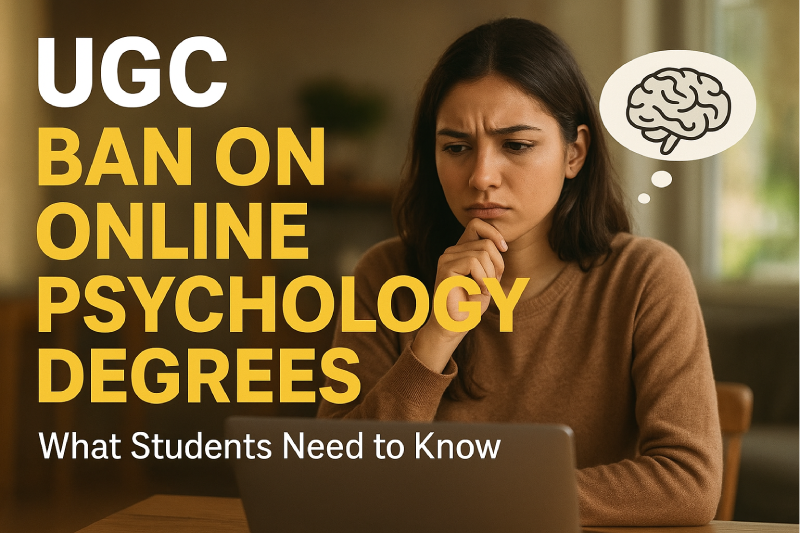
Madras University Halts Psychology Distance Courses After UGC Ban
In a significant shift impacting thousands of students, the University of Madras has announced that it will stop admissions to its distance mode psychology courses for the academic year 2025-26. The decision comes in response to the University Grants Commission’s (UGC) directive to withdraw approval for healthcare and allied disciplines in open and distance learning (ODL). The move has sparked debate among academicians, students, and education experts, highlighting the tension between ensuring quality training and maintaining access to higher education.
UGC’s Directive and Its Scope
Earlier this month, the UGC issued a notice stating that higher educational institutions will no longer be permitted to offer psychology, microbiology, food and nutrition science, biotechnology, and clinical nutrition and dietetics under the ODL framework. This ruling is aligned with the National Commission for Allied and Healthcare Profession Act, 2021, which emphasizes the need for rigorous in-person training in these fields due to their applied and clinical nature.
The UGC categorically stated:
- No institution can admit students in these courses under distance mode from July-August 2025 onwards.
- Recognition already granted to such programs stands withdrawn.
- Any institution found violating the guidelines will face strict consequences.
The underlying rationale is that disciplines in healthcare and allied sciences require practical exposure, laboratory work, and supervised training—elements that are often difficult to replicate in virtual or distance learning formats.
Impact on Madras University Students
The timing of the directive has created a dilemma for the Institute of Distance Education (IDE) at the University of Madras. By mid-August 2025, the IDE had already admitted nearly 400 students into its three psychology distance programs:
- BSc Psychology
- MSc Psychology
- MSc Counselling Psychology
These courses were among the most sought-after offerings in the university’s distance education portfolio, attracting working professionals, homemakers, and students unable to pursue full-time education.
A senior university official noted that the administration is preparing to write to the UGC for clarity regarding the students who have already enrolled and paid their fees. If the UGC maintains its stand, Madras University may be compelled to transfer students to alternative programs or issue fee refunds. This uncertainty has left many students anxious about their academic future.
Why Psychology Courses in Distance Mode Were Popular
Over the past decade, psychology has emerged as one of the most preferred disciplines in undergraduate and postgraduate studies, driven by rising awareness of mental health, counselling, and behavioural sciences. However, the limited seats in regular psychology programs across universities created a high demand-supply gap.
Distance learning offered a practical solution for:
- Working professionals seeking career shifts into counselling or human resource roles.
- Students in rural or remote areas without access to universities offering psychology programs.
- Women and homemakers are balancing education with family responsibilities.
For many, the distance mode provided an affordable and flexible pathway to pursue higher education in psychology, an opportunity now curtailed by the UGC’s ban.
Mixed Reactions from Academia
The UGC’s decision has drawn divided opinions within the academic community.
Supporters of the ban argue that:
- Psychology and other healthcare-related fields require hands-on training in labs, hospitals, or counselling centers.
- A distance-only model risks producing graduates without the necessary skills to practice responsibly.
- The credibility of such degrees may be questioned in the job market without adequate in-person exposure.
On the other hand, critics highlight that:
- A complete ban reduces access to education for thousands of aspiring students.
- To meet the training requirements, distance mode courses could incorporate mandatory lab sessions, internships, or weekend contact classes.
- The demand for psychology graduates, especially in schools, corporates, and healthcare institutions, is steadily rising, and restricting distance programs could worsen the shortage of trained professionals.
Former Vice-Chancellor of Madras University, P. Duraisamy, expressed his reservations about the UGC’s move. He noted that while practical training is vital, a blanket ban overlooks the potential of blended models. “UGC should think of making in-person training mandatory through contact classes instead of not permitting distance mode programmes in these areas,” he suggested.
Broader Implications for Higher Education
The decision is not just about Madras University but part of a larger policy shift in Indian higher education. By withdrawing recognition of allied and healthcare courses in ODL, the UGC is signalling a push towards quality over quantity, ensuring graduates possess the competencies needed in sensitive fields like psychology and biotechnology.
However, the move also raises questions about inclusivity and equity:
- How will students from economically weaker sections, who relied on affordable ODL programs, pursue these disciplines now?
- Will universities increase the intake capacity of regular programs to accommodate displaced students?
- Can hybrid models—combining online theory with in-person labs—offer a middle ground?
These are pressing issues that policymakers will need to address as the fallout of this decision unfolds.
The Road Ahead
The University of Madras's immediate priority is resolving the fate of the 400 students already admitted. The institution has assured that no student will be left stranded, and options such as fee refunds or transfers will be explored.
For the larger academic ecosystem, the episode serves as a wake-up call to revisit the structure of ODL programs in India. While distance education has played a transformative role in expanding access, specific fields may require innovative delivery mechanisms to balance flexibility with rigor.
Conclusion
The suspension of psychology distance courses at the University of Madras reflects a larger shift in India’s higher education landscape, where regulatory bodies prioritize practical competence and professional readiness over wide-scale enrollment. While the UGC’s decision is rooted in quality concerns, it has also sparked debate on access, inclusivity, and the role of distance learning in the future of higher education.
As students and universities navigate this transition, one thing is clear: the demand for psychology and allied healthcare disciplines will continue to grow, and education policymakers must find sustainable ways to meet it without compromising academic integrity.



